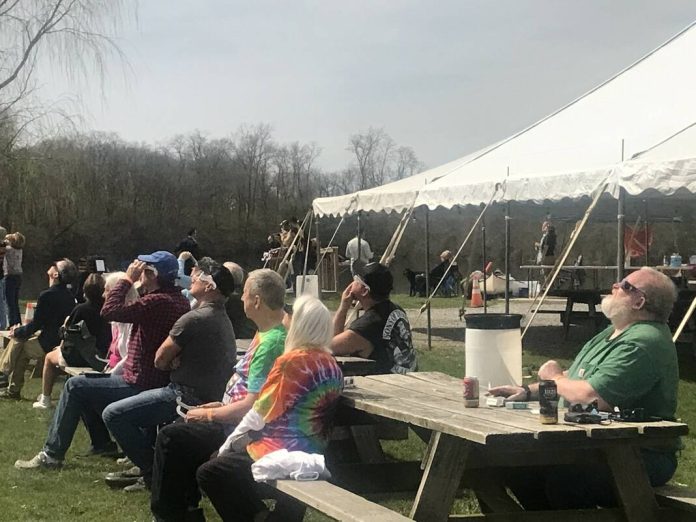GILBOA — Storms in Texas sent amateur photographer Robert Fidler on a last-minute trip to Gilboa in Putnam County.
“This is one of the few areas that’s supposed to get clear weather,” said Fidler, who traveled from San Diego, California, to witness his first total solar eclipse from Gilboa Quarry.
Fidler taped an astro-solar filter, a film that blocks most of the sun’s rays from damaging the camera lens, to his camera as he waited for the sky to darken.
Twenty minutes before the partial eclipse was to begin, Fidler glanced at the sky and wondered whether the clouds gathering above him would block his view after all.
“This is my first rodeo doing this,” Fidler said, “so things will probably go wrong. It’s just about being here. We’re just hoping, just glad there’s good weather somewhere.”
Fortunately, nature treated Findler and campers in Gilboa to a superior view of the eclipse, free from cloudy skies and storms that eclipse chasers encountered elsewhere.
Campers came from far and wide to Gilboa Quarry, where they could scuba dive and watch the eclipse with their families.
Brothers Steve and Frank French decided to make the 133-mile trip from the Detroit suburbs after listening to Frank’s daughter rave about the 2017 eclipse.
“(She) was just fascinated,” Frank French said.
His home in West Bloomfield, Michigan, experienced a partial eclipse, but the brothers wanted to take in the full three minutes and 51 seconds of darkness experienced by Gilboa, where they used to scuba dive.
“I might not be here for (the next eclipse),” Steve French said.
Fellow Michigander Ken Temple arrived at Gilboa Quarry on Sunday morning.
“If it wasn’t for this place, I don’t know that I would have come down here,” said Temple, who dives in Gilboa each summer.
Temple, whose home in Lansing experienced 90% totality, planned to set up an underwater camera so he could photograph the stages of the eclipse, while he watched from the surface.
“It’ll watch this turn from daylight to dark and back to light,” he said.







